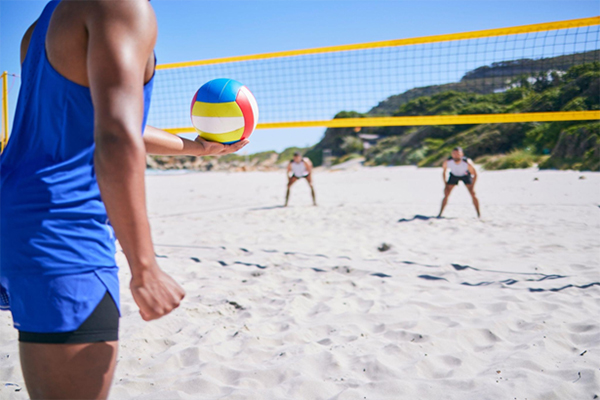
It’s the perfect time of year to dip your toes in the sand and get active with beach volleyball! Whether you are trying to volley or make that perfect spike, you never want to get sidelined due to an injury. This is why it is essential to take precautions to protect one of the most active joints in beach volleyball: your wrist.
When serving, passing, setting, or spiking, your wrists are almost always in use during volleyball. Repetitive use of your wrist in these actions leaves it susceptible to injury. Additionally, any blunt force to the wrist, either from a fall or a hit by the ball, can result in injury. Prioritizing your wrist health is necessary to avoid any potential wrist sprains, fractures, and overuse injuries.
Let’s discuss some tips on how you can manage your wrist health and prevent injury:
- Always Warm-up/Stretch: Never overlook stretching and warming up your wrists before a workout or This will increase blood flow to your wrists as well as loosen up the joint to prepare it for play.
- Utilize Proper Technique: If you are new to volleyball, getting the proper technique down can be an adjustment. Make sure to practice the proper way to serve, pass, strike, or block so that you don’t put your wrists at risk.
- Wear Protective Gear: Wrist guards or braces can help to stabilize your wrist while playing This extra support will discourage excessive movements and help to prevent injury.
- Do Wrist Exercises: When you aren’t playing a game, try to dedicate time to practicing targeted wrist Building strength and flexibility in your wrist will help to reduce the likelihood of a wrist injury.
- Stay Aware: Beach volleyball differs from many other sports because it is played on the Sand can be a pretty uneven terrain, making quick movements harder and falling easier. If you find yourself falling, never brace yourself with your arm as this oftentimes leads to injury. Be aware and adapt to your surroundings and this will help you avoid injury.
Avoiding injuries on the sand will be easier than you think when following these helpful tips. If you have suffered a wrist injury and are needing treatment, Dr. Shrouder-Henry is here to help! He offers various treatment options so that you can get back to doing what you love ASAP. Reach out to him today!
AUTHOR: Jason Shrouder-Henry MD, MBA is a Board Certified and fellowship-trained orthopedic surgeon specializing in the hand, wrist, elbow and shoulder throughout Chicagoland.


